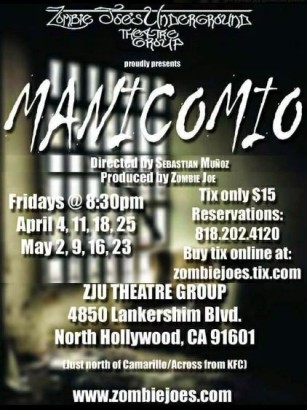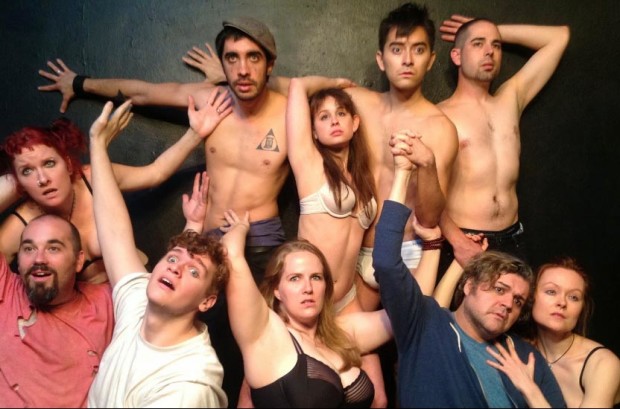In case you haven’t already googled it, I’ll just tell you that “manicomio” means “madhouse” in Spanish. (And yes, I can hear those of you who know me laughing your collective asses off right now — it was only a matter of time until somebody hauled me away!) This was a wonderful project for my first dramatic experience, and I’m extremely proud of what our troupe accomplished with this production. We were committed to doing something profoundly and powerfully different on stage — using live theater to explore that blurred line between normalcy and pathology, to unearth the humanity buried beneath the insanity.
Putting The Inmates In Charge
 Far too often, we who swim in the mainstream think of crazy people as being somehow “different than” — fundamentally unbalanced or broken or damaged in a way that could never happen to the rest of us. But I spent a lot of time around these folks during my Social Work tenure, and I can vouch that it’s not always an inherent neurologic defect causing the psychologically disordered to lose touch with reality.
Far too often, we who swim in the mainstream think of crazy people as being somehow “different than” — fundamentally unbalanced or broken or damaged in a way that could never happen to the rest of us. But I spent a lot of time around these folks during my Social Work tenure, and I can vouch that it’s not always an inherent neurologic defect causing the psychologically disordered to lose touch with reality.
A human brain can only stand so much pressure before it snaps. Take any random group of “normies,” and subject them to extreme stress (especially the kind that comes with living on the street, wondering when that next meal will happen, where you’re going to sleep, whether you’ll be raped or beaten to a pulp that day) — and you stand a good chance of pushing them over the edge. We all have limits, it’s just a matter of where your particular line in the sand is drawn.
I believe (in that cynical “if-you-think-some-safety-net-is-gonna-catch-you-when-you-fall-you’re-seriously-delusional” way of mine) that we’re all a paycheck short of homelessness, an accident away from disability, a few neurotransmitters (or crippling life-upheavals) shy of mental illness. When I see folks shuffling along the sidewalk in bare feet and soiled pants, babbling, gesticulating wildly to themselves, battling with inner demons and hallucinations who knows what all — I think, “There but for the grace of god go I.”
I wrote this ending monologue early on in our collective storytelling process — and while the group landed on a different finale, I still feel this statement perfectly summarizes what Manicomio had to say:
It’s easy for you to classify us as “screwed-up,” “dysfunctional,” “deranged.” Go ahead — labeling what you don’t understand feels comfortable and convenient. It keeps you safe at night. We asylum-dwellers live on the fringe of convention. At first glance we seem foreign and peripheral — far away, faded, something less than human. But take a good hard look in the mirror, and you’ll see a hint of us in your own reflection — a shadow of our insanity lurking behind your more socially-acceptable daily frustrations.
Those behaviors you’re so proud of? The ones that earned you a college degree and the big promotion, bought you that three-car garage and your trophy spouse? The ladder-climbing, the high standards, that stress you wear like a badge of honor? Four cups of coffee each morning to get going, then a bottle of wine at night to relax? There’s a dark, destructive side to them all. Workaholism, sleep-deprivation, self-medication, conformism, martyrdom, hypocrisy, perfectionism — taken to an extreme, they look an awful like “schizophrenia,” “bipolar,” even “psychosis.” But because they help you to fit in with the crowd, they’re considered normal.
One Person’s Anguish Is Another’s Art
 Each cast member was tasked with personalizing a psychological malady so the audience could relate. I chose “hyperthymesia” — “extreme autobiographical memory.” Imagine remembering everything that had happened on every single day of your life with absolute clarity, to the point of fully re-experiencing emotions, sensations, even illnesses — each joy or stab of pain just as fresh and raw as the first time you felt it. While this might initially sound appealing, it’s actually incredibly debilitating — akin to being robbed of both your present and your future because you’re stuck endlessly reliving the past. In fact, one afflicted woman (who I heard interviewed on NPR, and whose MRI is shown in this picture) admitted that her only means of escape from the unrelenting stream of traumatic flashbacks was disappearing into a particular childhood memory, as many as a dozen times a day!
Each cast member was tasked with personalizing a psychological malady so the audience could relate. I chose “hyperthymesia” — “extreme autobiographical memory.” Imagine remembering everything that had happened on every single day of your life with absolute clarity, to the point of fully re-experiencing emotions, sensations, even illnesses — each joy or stab of pain just as fresh and raw as the first time you felt it. While this might initially sound appealing, it’s actually incredibly debilitating — akin to being robbed of both your present and your future because you’re stuck endlessly reliving the past. In fact, one afflicted woman (who I heard interviewed on NPR, and whose MRI is shown in this picture) admitted that her only means of escape from the unrelenting stream of traumatic flashbacks was disappearing into a particular childhood memory, as many as a dozen times a day!
It turns out that being able to forget loss and suffering (or at least turn the volume down on a stressful recollection) is one of the most important coping skills homo sapiens possess. Without this ability, the crappy days drown everything else out and it’s easy to get caught in a loop. I thought to myself, “If I were in that situation, which moments would I want to flee? And where would I run for solace?” I chose three seminal experiences to represent the spectrum of human emotion — the bliss of a new love, the terror of that first day in school, and the stew of feelings I still have raging inside of me over my own mother’s death.

As I perched on a block mid-stage, my castmates marched in a circle around me — the highly regimented beat of a drum symbolizing my out-of-sync-ed-ness with their conception of time. Every few moments, a loud bang would sound as they came to a halt and called out the date in unison. Each time, this caused a switch to flip in my head, sending me into a different memory from my past. The dates came faster and faster as the piece progressed, pushing me into a more and more frenzied state — until the pressure became too great, and I collapsed under the strain (with a ginormous melodramatic scream, of course). The room went silent and I rose to my feet — recalling that awful evening when I had to ask a hospital nurse to end my mother’s life Then one final prompt sent me back to my safe space, that cherished first kiss.
BANG!
It’s a warm and sunny Tuesday afternoon, the first time you kiss me. We’re walking through the neighborhood, and a breeze is blowing the scent of jasmine in my face when you take my hand in yours. In the distance I can hear a dog barking. You glance over at me and smile…
BANG!
Everywhere kids running and screaming — I can’t take all the noise! Ow! Hey you stupidhead — watch where you’re going! And what are you laughing at? You don’t even know me yet! It’s too hot and this place stinks like like sweaty socks — I wish I was anywhere but here, the doctor’s office getting a shot, or even sitting in the corner in time out. Oh I don’t like it here…
BANG!
I hate this fucking place — everything about it. That awful light over your bed that keeps flickering on and off, the smell of piss and Lysol and disease. You were healthy as a horse! I expected you to live at another 10 or 20 years — so why am I sitting here watching you die in a hospital bed? I could slap that stupid doctor who kept saying you were just “getting older” — too cowardly to be honest, too chickenshit to get your blood on his hands….
BANG!
We pass a bakery, and I can smell the fresh blueberry muffins coming out of the oven. In the shop window reflection, I catch you looking at me, looking at my mouth. You’re going to kiss me, I know you’re going to kiss me — and a little shiver runs down my spine…
BANG!
Please momma, don’t make me. I don’t want to go out there alone — I don’t know anybody here. I want to stay home with you — oh, I’ll be so good if you just let me stay with you…
BANG!
Why did you tell me you were “fine” when you really weren’t? I wish you’d told me the truth — I’m so fucking angry at you for that! Every time that C-Pap machine forces air into your lungs, it’s like someone sticking an icepick through my heart over and over again….
BANG!
You put your hands on the sides of my face — there’s a rough spot on your left index finger. You pull me close and I can feel your body pressed against mine…
BANG!
Oh momma — I know you want me to act brave and be a big girl, but I don’t feel like a big girl. Please stop looking through your purse. I need you to pay attention to me….
BANG!
The squeak of that woman’s shoes is driving me crazy — and the constant beeping from that goddamned pulse oximeter….
BANG!
I’m so sorry momma — please don’t be mad. I’m not trying to be bad….
BANG!
It’s so cold in here…
BANG!
Brushing my hair away from my cheek…
BANG!
My head hurts and I feel dizzy…
BANG!
Watching you cough up blood…
BANG!
The smell of your skin…
BANG!
Oh Momma, I think I’m going to be sick!
BANG!
You knew I’d take care of things when you said, “It hurts too much. I don’t want to be here anymore” — but why did you wait until everyone else had left the room to ask me to kill you? I’m not even sure if you felt me kiss your forehead or heard me say that I love you that one last time before they gave you the morphine.
BANG!
Your lips are warm and soft and wet, and your mouth tastes like toothpaste. You taste so good! I’m the happiest I’ve ever been in my life. This, right here, right now — THIS is what content feels like.
I wish I had a video to show you! (Unfortunately, the theater owner was dead-set against any taping.) Of course, my segment is just a single brushstroke in a much larger picture — one that depicts the bravest artists I’ve ever met stretching boundaries, embracing fears, pressing hard on those sore spots in their souls. But at every performance, attendees pulled me aside to tell me how powerfully my story had affected them. (Many, including our assistant director, had gone through similar end-of-life experiences with loved ones — they knew exactly the sort of despair I was expressing.) I can’t tell you how gratifying it was to have folks really understand such a highly personal piece of art — especially when it was my first attempt at this particular genre. (An exceptionally positive way to conclude my thespian cherry-poppage!)
I adored the staging and transitions, the light effects, the weird electronic background noises, the way we blended our many traumas together into a mix of pathos/humor, love/horror, and rage/reclamation. Pre-show was a schizoid Improv Everywhere skit (where you couldn’t tell actors from audience), and the ending was priceless — patients vacating the theater like Thorazine-drugged zombies, locking patrons in to take our place as the new inmates running the asylum.
Interestingly, the producer’s day job is teaching art in a mental institution — his colleagues’ comments were along the lines of, “You nailed it. I feel like I’m at work!” I guess that’s as big a compliment as a show like this could receive. But the best comment made about my individual piece by the theatrical press was, “Wonderful sense-memories — mortifying and mirthful, distressing and delightful, tormented and ticklish — the likes of mortal magnificence, hot and cold terrifically terrestrial tales all being told.” Cool! Here are a few other reviews, if you’re interested in what the scribes had to say.
- Continued Risk-Taking Vibrancy — Manicomio represents an experimental probing of psychological horror’s second tenet — the truly frightening is that which is unspeakable, but which is present in the deep emotional scars and half-remembered life traumas that mark us all. (“Manicomio,” by the way, is Spanish for “madhouse.”) Loosely connected and discomfiting, in these company-created pieces woven from song, choreography and text, the unspeakable takes center stage — in what might best be described as 13 highly theatricalized nervous breakdowns. The show’s most emblematic metaphor comes during the preshow, when the ensemble directly intermingles with the audience and engages in informal banter that is continuously broken by a discordant clang — during which the actors freeze mid-sentence until a subsequent clang releases their paralysis and they continue as if uninterrupted. This show, the gesture implies, is concerned less with what is literally being said than with the interstitial meanings that lurk between the words. What follows ranges from the eerily haunting (Jessica Weiner witnessing key moments of her life as a disembodied specter) to the mordantly harrowing (Jackie Lastra as a little girl whose good thoughts about her friends are systematically poisoned by dark suggestions from her homicidally-inclined doll) to the heartbreaking (Ramona Creel expressing a powerful simultaneous combination of grief, terror, and wistful first love) — merely a few standouts in an evening that eloquently testifies to the continuing, risk-taking vibrancy of ZJU’s creative reach.
- The World Through Night-Tinted Glasses — Manicomio isn’t really a script per se, but more like a piece of group performance art. The director Sebastian Muñoz explained to me much of what was happening on stage came from ideas put forth by cast members.In essence the setting is a madhouse. Everyone we see, pretty much from the moment we walk into the space, is a lunatic. Someone who sees the world in a way extremely different from the way you and I (presumably) do. Now, the classic (or if you prefer cliche) reaction to insanity is fear. A withdrawal at full speed. More rare, but perhaps more telling, are positive portrayals of the mentally ill as perhaps knowing something we do not. The denizens of Manicomio follow into the divine madmen category. Not that they necessarily know something you do not, but that they achieve something at which the “sane” all too often fail. Miserably. They come together. They unite. A kaleidoscope of fractured personalities and perception, often hilarious and sometimes disturbing. Nearly always entertaining. Yet all understandable — even the segments not in English still come across, as do the ones without words at all. This whole piece is about thinking, and seeing, outside the box. Not necessarily discarding the box, nor never returning, or even disdaining the box in which we all keep stuff after all. But remembering the box is there to serve us, not for us to serve it. It is to be our tool, not our straightjacket. Did I mention this is something of a musical?
- Check In To Zombie Joe’s Very Own Asylum — This show is about a place no one ever wants to go to, either mentally or physically — but once you‘re in (and you go in), this amazingly complex performance piece will take your own mind places in your own head you never thought you had. This one truly left me thinking after I left the theatre (and then wanting to see it again to verify my own conclusions) — it was chilling. Manicomio literally translated means “asylum or hospital for the mentally ill.” That’s exactly where you are when you see this. Jackie Lastra’s voice and her cackle of a laugh will send chills up and down your spine. Kevin Van Cott is a pure delight to watch. Charlotte Bjornbak brings dark passion to her piece and was exciting to watch and listen too. Ramona Creel will entice you with her split consciousness/personality and the actual calendar date (of the time you see the show) — so when she literally goes into her four stages of reality, it will makes you never forget that date. Zombie Joe’s has tapped the inner mind and all the dark sides and aspect of what most nightmares are made in this production of Manicomio. That’s what makes it such a truly memorable performance piece experience to watch. You just have to see it to believe it!
- Experimental Theater Gone Crazy — Manicomio is an avant garde ensemble piece that was collaboratively workshopped by the director with his cast. Director Sebastian Muñoz asked each of his cast members to choose a specific mental illness, suggested that they dig into their own experiences for ways in which to showcase their own personal characters, and then he massaged the material into Manicomio. For the duration of the show, the focus shifted from one performer to the next; each, in turn, gave a speech or performed various mannerisms indicative of his character’s affliction. The presentations were highly stylized. A little girl with a demonic doll. A boy trapped in a world of childhood sexual abuse. A man infested with invisible insects. A woman caught in a psychologically-fracturing time-loop. There is so much variety in the vignettes, that they will likely appeal to different audience members for different reasons. Since I’m all about leaving reality behind and taking a trip in the safety of a theater space, I enjoyed the show quite a bit. It is refreshing for one to step out of one’s sense of normalcy for a while and into the world of someone else’s vision.
- Not A Play, More Of An Experience — I enter the black box theatre that is ZJU to a packed house. Not only is the audience overflowing, but the stage is vibrantly alive with zombie-like circus performers — speaking, miming, muttering, mimicking various postures and mannerisms.The feel of this pre-show-fore-show vacillates betwixt that of a 60’s cocktail party, Fellini Film and sleepover hosted by Marcel Marceau. Two synthesized keyboard blasts sound from the tech booth above the stage nearly reminding me of the eerie blindfolded organ serenade in Eyes Wide Shut. Hauntingly ritualistic, this sound prompts all actors to stop whatever they are doing and freeze as the theatre, in kind, renders itself cryptically silent. (My, my — we the audience members certainly have a lot to talk about don’t we? Lively bunch, ey?) It is eerie, foreboding, dirty-antiseptic, yet light (melodically speaking anyway) in the most avant-garde, anti-establishment of fashions and I like it! Just as quickly as the lights darken do they come up, spotlight on one of our pyjama-clad players mounted high atop a rehearsal block, cast of minions surrounding him campfire style. “Fact!” he will exclaim, then go on to recite a series of harrowingly interesting odd truisms.The lights dim and come up, intensely focused spotlights on two sets of latin lovers, leaving the rest of the cast in the virginal valley of dark stars in the dell that is the deck below, staring up at the glowing lovers in all their beatific sunny repose. The entire vibe of this piece so far reminds me of this film I once saw wherein a guy did this monologue on the tracks of an old abandoned subway station with only a mere theatrical house light or ol’ skool overhead light illuminating his artistry — so awesome! A guy in a pig costume alights the stage playing a snare drum. The drum is struck militarily with two of his two forelegs as he leads his combatant cast members around in circular formation. Our monologuist for the moment alights a black box and begins uttering sentences of interest both harrowing and hopeful, slices of life, no doubt, from her past — or future perhaps depending on what universal plane of existence she currently inhabits (but I’m guessing these are mostly from her past). Betwixt sentences, her cast mates chant “April 4th!” (The date on which we are witnessing this event: April 4th 2014.) But I am guessing all these things that happened to our performer occurred on April 4th 1978 and she probably wasn’t even born by April 4th 1978 so that’s really saying something! She reminisces being kissed in the rain, of losing a loved one — her mother perhaps? (You were supposed to live forever, and now I’ve got to watch you wither away in a hospital bed — on life support!) Of loves gone by. (You kissed me and your mouth tasted like toothpaste.) Wonderful sense-memories — mortifying and mirthful, distressing and delightful, tormented and ticklish — the likes of mortal magnificence, hot and cold terrifically terrestrial tales all being told. A “little girl” (the actress in the tutu) appears nearly magically in another elevated lit portion of the black box just under the sound booth, hugging a blonde, tousle-haired doll — who tells the actress all manner of horrible things about her so-called new found friends and their less than honest intentions, leaving her trembling in all her dysfunctional child-hooded paranoia. The lights dim completely as all actors fall in heaps on top of one another moaning and groaning like a gridlocked version of Dante’s Inferno set in a freeway traffic jam of free-floating bodies. Better yet — a hell bound orgy constrained in cloth the likes of which the still costumed actors cannot break free to complete the ritual. The most sensual, yet discouraged live haunted house you’ve ever taken a walk-thru.
Click here for reuse options!
Copyright 2014 RamonaCreel.com
Make Your Friends Jealous! Show Everyone What A Big Fricking Brain You Have! Be The First To Share This Amazing Content With Them!






Manicomio
In case you haven’t already googled it, I’ll just tell you that “manicomio” means “madhouse” in Spanish. (And yes, I can hear those of you who know me laughing your collective asses off right now — it was only a matter of time until somebody hauled me away!) This was a wonderful project for my first dramatic experience, and I’m extremely proud of what our troupe accomplished with this production. We were committed to doing something profoundly and powerfully different on stage — using live theater to explore that blurred line between normalcy and pathology, to unearth the humanity buried beneath the insanity.
Putting The Inmates In Charge
A human brain can only stand so much pressure before it snaps. Take any random group of “normies,” and subject them to extreme stress (especially the kind that comes with living on the street, wondering when that next meal will happen, where you’re going to sleep, whether you’ll be raped or beaten to a pulp that day) — and you stand a good chance of pushing them over the edge. We all have limits, it’s just a matter of where your particular line in the sand is drawn.
I believe (in that cynical “if-you-think-some-safety-net-is-gonna-catch-you-when-you-fall-you’re-seriously-delusional” way of mine) that we’re all a paycheck short of homelessness, an accident away from disability, a few neurotransmitters (or crippling life-upheavals) shy of mental illness. When I see folks shuffling along the sidewalk in bare feet and soiled pants, babbling, gesticulating wildly to themselves, battling with inner demons and hallucinations who knows what all — I think, “There but for the grace of god go I.”
I wrote this ending monologue early on in our collective storytelling process — and while the group landed on a different finale, I still feel this statement perfectly summarizes what Manicomio had to say:
One Person’s Anguish Is Another’s Art
It turns out that being able to forget loss and suffering (or at least turn the volume down on a stressful recollection) is one of the most important coping skills homo sapiens possess. Without this ability, the crappy days drown everything else out and it’s easy to get caught in a loop. I thought to myself, “If I were in that situation, which moments would I want to flee? And where would I run for solace?” I chose three seminal experiences to represent the spectrum of human emotion — the bliss of a new love, the terror of that first day in school, and the stew of feelings I still have raging inside of me over my own mother’s death.
As I perched on a block mid-stage, my castmates marched in a circle around me — the highly regimented beat of a drum symbolizing my out-of-sync-ed-ness with their conception of time. Every few moments, a loud bang would sound as they came to a halt and called out the date in unison. Each time, this caused a switch to flip in my head, sending me into a different memory from my past. The dates came faster and faster as the piece progressed, pushing me into a more and more frenzied state — until the pressure became too great, and I collapsed under the strain (with a ginormous melodramatic scream, of course). The room went silent and I rose to my feet — recalling that awful evening when I had to ask a hospital nurse to end my mother’s life Then one final prompt sent me back to my safe space, that cherished first kiss.
I wish I had a video to show you! (Unfortunately, the theater owner was dead-set against any taping.) Of course, my segment is just a single brushstroke in a much larger picture — one that depicts the bravest artists I’ve ever met stretching boundaries, embracing fears, pressing hard on those sore spots in their souls. But at every performance, attendees pulled me aside to tell me how powerfully my story had affected them. (Many, including our assistant director, had gone through similar end-of-life experiences with loved ones — they knew exactly the sort of despair I was expressing.) I can’t tell you how gratifying it was to have folks really understand such a highly personal piece of art — especially when it was my first attempt at this particular genre. (An exceptionally positive way to conclude my thespian cherry-poppage!)
I adored the staging and transitions, the light effects, the weird electronic background noises, the way we blended our many traumas together into a mix of pathos/humor, love/horror, and rage/reclamation. Pre-show was a schizoid Improv Everywhere skit (where you couldn’t tell actors from audience), and the ending was priceless — patients vacating the theater like Thorazine-drugged zombies, locking patrons in to take our place as the new inmates running the asylum.
Interestingly, the producer’s day job is teaching art in a mental institution — his colleagues’ comments were along the lines of, “You nailed it. I feel like I’m at work!” I guess that’s as big a compliment as a show like this could receive. But the best comment made about my individual piece by the theatrical press was, “Wonderful sense-memories — mortifying and mirthful, distressing and delightful, tormented and ticklish — the likes of mortal magnificence, hot and cold terrifically terrestrial tales all being told.” Cool! Here are a few other reviews, if you’re interested in what the scribes had to say.
- Not A Play, More Of An Experience — I enter the black box theatre that is ZJU to a packed house. Not only is the audience overflowing, but the stage is vibrantly alive with zombie-like circus performers — speaking, miming, muttering, mimicking various postures and mannerisms.The feel of this pre-show-fore-show vacillates betwixt that of a 60’s cocktail party, Fellini Film and sleepover hosted by Marcel Marceau. Two synthesized keyboard blasts sound from the tech booth above the stage nearly reminding me of the eerie blindfolded organ serenade in Eyes Wide Shut. Hauntingly ritualistic, this sound prompts all actors to stop whatever they are doing and freeze as the theatre, in kind, renders itself cryptically silent. (My, my — we the audience members certainly have a lot to talk about don’t we? Lively bunch, ey?) It is eerie, foreboding, dirty-antiseptic, yet light (melodically speaking anyway) in the most avant-garde, anti-establishment of fashions and I like it! Just as quickly as the lights darken do they come up, spotlight on one of our pyjama-clad players mounted high atop a rehearsal block, cast of minions surrounding him campfire style. “Fact!” he will exclaim, then go on to recite a series of harrowingly interesting odd truisms.The lights dim and come up, intensely focused spotlights on two sets of latin lovers, leaving the rest of the cast in the virginal valley of dark stars in the dell that is the deck below, staring up at the glowing lovers in all their beatific sunny repose. The entire vibe of this piece so far reminds me of this film I once saw wherein a guy did this monologue on the tracks of an old abandoned subway station with only a mere theatrical house light or ol’ skool overhead light illuminating his artistry — so awesome! A guy in a pig costume alights the stage playing a snare drum. The drum is struck militarily with two of his two forelegs as he leads his combatant cast members around in circular formation. Our monologuist for the moment alights a black box and begins uttering sentences of interest both harrowing and hopeful, slices of life, no doubt, from her past — or future perhaps depending on what universal plane of existence she currently inhabits (but I’m guessing these are mostly from her past). Betwixt sentences, her cast mates chant “April 4th!” (The date on which we are witnessing this event: April 4th 2014.) But I am guessing all these things that happened to our performer occurred on April 4th 1978 and she probably wasn’t even born by April 4th 1978 so that’s really saying something! She reminisces being kissed in the rain, of losing a loved one — her mother perhaps? (You were supposed to live forever, and now I’ve got to watch you wither away in a hospital bed — on life support!) Of loves gone by. (You kissed me and your mouth tasted like toothpaste.) Wonderful sense-memories — mortifying and mirthful, distressing and delightful, tormented and ticklish — the likes of mortal magnificence, hot and cold terrifically terrestrial tales all being told. A “little girl” (the actress in the tutu) appears nearly magically in another elevated lit portion of the black box just under the sound booth, hugging a blonde, tousle-haired doll — who tells the actress all manner of horrible things about her so-called new found friends and their less than honest intentions, leaving her trembling in all her dysfunctional child-hooded paranoia. The lights dim completely as all actors fall in heaps on top of one another moaning and groaning like a gridlocked version of Dante’s Inferno set in a freeway traffic jam of free-floating bodies. Better yet — a hell bound orgy constrained in cloth the likes of which the still costumed actors cannot break free to complete the ritual. The most sensual, yet discouraged live haunted house you’ve ever taken a walk-thru.
Click here for reuse options!Copyright 2014 RamonaCreel.com
Make Your Friends Jealous! Show Everyone What A Big Fricking Brain You Have! Be The First To Share This Amazing Content With Them!
Tags: artist, author, fiction and creative writing, performance art, social commentary
(iCopyright widget here)
"I Have More To Say About This... No Surprise!"
(Press-Central For Handy Soundbites, Useful Info,
And A Good Wet-Your-Pants Laugh)
My Favorite Road Trip Playlist
If you would like to reprint this page, please contact me